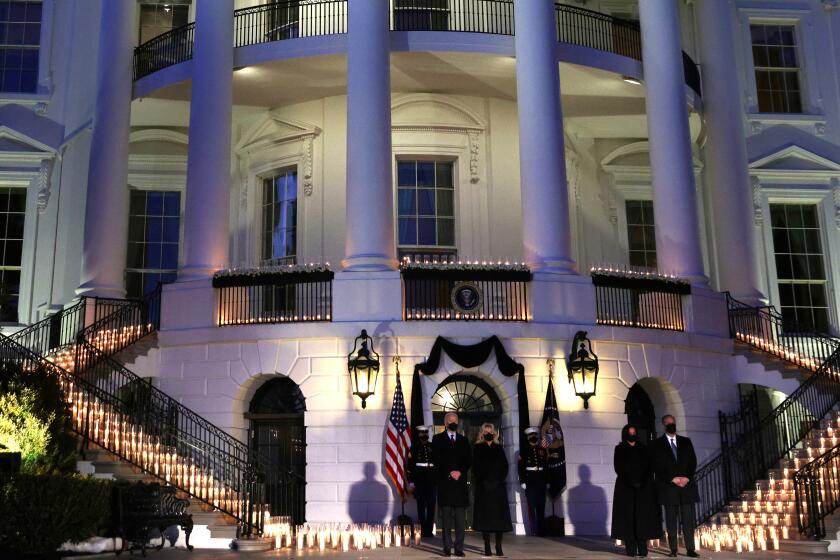One more thing to lose sleep over: Who’s running your state’s elections?

- Share via
WASHINGTON — Former President Trump, in exile at Mar-a-Lago, isn’t acting much like a retiree.
A week ago, he announced that his proposed media venture, Trump Media & Technology, had lined up $1 billion in commitments from investors, on top of $250 million already promised.
He’s raising money from loyalists for a collection of political committees that boasted more than $100 million in cash on hand the last time they disclosed their holdings.
And he’s been endorsing candidates for public office far more often than former presidents normally do: 14 candidates for the Senate, 21 for the House of Representatives, 10 would-be governors and 12 state legislators so far.
He has also developed an avid interest in one of the most obscure jobs in state politics: secretary of state.
Americans may be making their peace with life in a pandemic, but they’re not happy with that. They expect Biden to achieve the victory he promised.
In Georgia, he’s endorsed a challenger to Republican Secretary of State Brad Raffensperger, the man who last year rejected Trump’s demand to “find” 11,780 more votes — the number he needed to defeat Joe Biden.
In Arizona, Trump has endorsed a GOP candidate who publicly proclaimed himself a member of the Oath Keepers militia and on Jan. 6 traveled to Washington to urge Vice President Mike Pence to reject his state’s electoral votes. (He marched on the Capitol that day, too, but says he didn’t witness the storming of the building.)
In Michigan, Trump backs a candidate who charged that Biden won the state because rigged voting software flipped thousands of votes. (A Republican-led investigation found her claim was false.)
There’s nothing random about the former president’s choices. All three races are in swing states that Biden won.
In all three, Trump loyalists have insisted that Biden’s victory was fraudulent, even though after more than a year they have found no evidence.
The last time those jobs were up, Trump made no endorsements for secretary of state in Georgia or anywhere else. It must not have seemed important to him at the time.
Now it does.
The reason is no mystery: In most states, the secretary of state is the chief elections officer, responsible for administering voting laws. In many states, including Arizona and Georgia, the secretary of state is the official who declares the winner.
Trump says he has not decided whether to run for president again in 2024. But just in case, he wants to choose as many referees as he can before the contest begins. If he ever finds himself disputing a vote count or trying to block a state’s electoral votes, he wants someone who owes him a favor on the other end of the phone.
“What we’ve seen over the past year is a national, coordinated campaign … that tried to overturn the results of the last election [and is] now laying the groundwork to potentially overturn the next one,” Jocelyn Benson, Michigan’s Democratic secretary of state, said last month on MSNBC.
Trey Grayson, a Republican who was Kentucky’s secretary of state until 2011, agrees. “As a Republican, I’m really bothered by how Trump is recruiting people for these jobs based only on whether they are personally loyal to him,” he told me. “The worst thing about it is that it’s all based on a lie” — the groundless claim that the 2020 election was stolen.
One irony, Grayson noted, is that secretaries of state don’t have power to alter election returns.
“The function of the job is basically counting the votes under the laws that are on the books,” he said. “Counting votes is counting votes.”
What they can do, however, is create doubt. Secretaries of state can refuse to certify an election result if they believe — or pretend to believe — something has gone wrong.
“The secretary of state can create uncertainty or cause delays,” Grayson said. “Eventually, the courts will rein you in, but you can cause problems in the short run.”
Which is what Trump wanted Raffensperger and others to do: refuse to certify their states’ elections to keep some of Biden’s electoral votes from reaching Congress.
This mini-crusade to put Trump loyalists in the most obscure statehouse office isn’t merely an act of revenge against Republicans who wouldn’t do his bidding. It’s part of a larger drive to make sure every GOP officeholder, from senators to city councils, is loyal to the Trump cause.
“We’re taking over the Republican Party … precinct by precinct,” former Trump advisor Stephen K. Bannon boasted last month.
The GOP’s new slogan might as well be “No non-Trump Republicans allowed.”
The question is whether Trump’s followers will succeed in taking over without much of a fight, especially when the fight is over low-visibility jobs at the bottom of the ballot.
“Other Republicans may not want to run the risk of running against the Trump folks,” Grayson warned.
“How do you get people to care?” he asked. “Nobody loses sleep over who their state’s secretary of state is.”
Thanks to Trump, they ought to.
More to Read
Get the L.A. Times Politics newsletter
Deeply reported insights into legislation, politics and policy from Sacramento, Washington and beyond. In your inbox three times per week.
You may occasionally receive promotional content from the Los Angeles Times.












